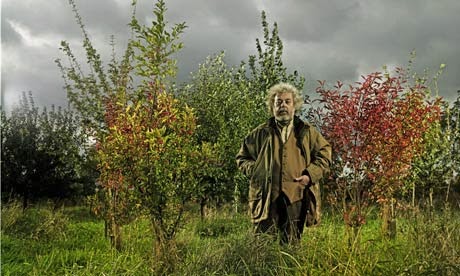The sad recent death of amateur poet, multimillionaire media mogul, and manic tree planter reminds me of the day I interviewed him back in 2008. Preparation is everything and knowing that this most eligible bachelor was rather fond of attractive young ladies, my magazine sent me to meet him with a pretty Dutch photographer in her twenties whose dress of choice was a very clinging all-leather cat suit. I can’t for the world think why she chose this particular outfit, but there you are.
 |
| In the Forest of Dennis |
 |
| With Oz defendants Neville and Dexter |
Anyway, we arrived for the interview at the office below his penthouse flat off Carnaby Street, which he still rented after four or more decades. While I sat on a huge couch next to an aquarium, which seemed to take up most of one side of the large but rather dingy room, the photographer was shown upstairs to take pictures of Dennis’s superb library of mainly modern firsts. When the great man arrived late from a generous lunch he was clearly in a good mood, as you might say. This was confirmed when, after adjourning to his office, I prepared for the interview by dropping my tape recorder and allowing all the batteries to fall out. ‘Hah! Hah! Hah! he gleefully exclaimed, ‘Another technophobe’ . I wasn’t, of course, but I knew that he was. I’d been warned that despite the fact that he owned several high-tech magazines, he wasn’t online and had no mobile phone. Nor, despite publishing for car-mad young men, did he drive. I also suspected that he had health problems when he soon after reached for several small bottles in his desk and swallowed a handful of pills.
The interview went remarkably well. There was to be a lot more raucous laughing from his direction and eye-popping amazement from me. We were there principally to discuss his latest book, How to Become Rich, but, of course, I was much more interested in his early hedonistic lifestyle and book collection. On the latter topics he did not disappoint. It appeared that long before the OZ trial one of his principal ambitions had been to defy the mores of his middle class childhood in Kingston on Thames. He dropped out of Hornsey College for the delights of sixties Soho when he had been asked to draw still lives. He saw the girls that Mick Jagger and other rock stars were pulling and took up the drums to attract the screaming groupies. On one occasion he had paid a particularly attractive woman £10,000 to spend a night with him. In all, he boasted that he had lavished several millions on drugs, alcohol and women. I can believe it.
As a collector, though he seemed to have rather old-fashioned tastes. He had always loved trees and, as everyone knows, modestly named the vast tracts of junior woodland he had created in south Warwickshire, ‘The Forest of Dennis‘.Naturally, he craved antiquarian books on arboriculture and proudly described his first edition of John Evelyn’s Sylva. Fine printing was another passion. When at last we climbed the stairs to his bachelor pad we found his library of modern firsts all together in one room. From further questions I sensed that evidence of his true tastes lay elsewhere, in his other homes in Warwickshire and the Caribbean, and that these neatly shelved rare and expensive volumes in their impeccable dust jackets were merely the trophies of a very wealthy but ill-educated man who had successfully cocked a snoop at his University-educated peers. That famous remark, made by the judge at the Oz trial, that Dennis had been let off more lightly because he was obviously less intelligent that his co-defendants, must have hurt.
We left, the cat-suited Dutch lady and myself, but not after Dennis had plied us both with wine (‘Did anybody mention the free wine?’) and given us several signed copies of his poetry books. In the following five or more years I often thought about Dennis, and had tried to negotiate another interview, this time focussing on his tree planting. But it never happened. Which is a pity. [R.M.Healey]

A great and admirable man. A hero to his valet.